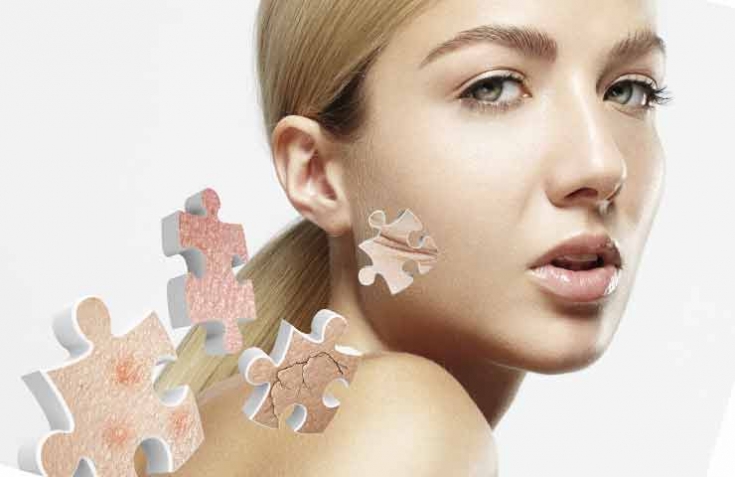Combined oral contraceptives, or COCs – a group of drugs used to prevent pregnancy as part of family planning. High efficiency, safety and ease of use have made hormonal contraception one of the most popular methods of preventing unwanted pregnancy in the world. Hormonal contraceptives are also first-line drugs in the treatment of polycystic ovary syndrome. It is well known that, in addition to its main effect, the use of oral contraceptives also has a number of other advantages, including – beneficial effect on the condition of the skin in women. How does this happen and is it really so – read further in the article estet-portal.com.
Problem skin and hormonal imbalance – oral contraceptives as a solution
Beautiful well-groomed skin – every woman's business card. Modern cosmetology offers a wide range of various products, but sometimes even the most correct care gives only a temporary effect. It is important to remember that the skin – it is a mirror of our health, and first of all – hormonal balance. Stress, malnutrition, overwork, genetic predisposition – all this can lead to a violation of neurohumoral regulation, and, as a result, the appearance of gynecological and dermatological problems. Properly selected combination of oral contraceptives will help correct hormonal failure, restore health and beauty.
Oral contraceptives:
- oral contraceptives: how they work;
- oral contraceptives and sebaceous glands – what is the connection;
- oral contraceptives – who they are not suitable for;
- oral contraceptives – not a panacea, but a component of a comprehensive acne treatment;
Follow us on Telegram.
Oral contraceptives: how they work
Hormonal contraception – family planning method invented in the 1960s. Today it is one of the most effective methods: Pearl index < 0.2.
The Pearl Index measures the number of pregnancies in one year in 100 women who used the same method of contraception. The value of the Pearl index is inversely proportional to the effectiveness of the method.
The active ingredients of hormonal contraceptives are analogues of female sex hormones – estrogen (ethinylestradiol) and progesterone (drospirenone, desogestrel, gestodene). Their use creates a stable concentration of sex hormones in the blood (we are talking about the most popular group of oral contraceptives – monophasic COCs), which inhibits the synthesis of gonadotropic hormones by the pituitary gland, and, as a result, – ovulation does not occur.
Oral contraceptives and sebaceous glands – what is the connection
It is well known that acne is an androgen-dependent disease: a pathological increase in the level of androgens leads to an increase in the function of the sebaceous glands and the production of sebum, which creates favorable conditions for the colonization of the skin by pathogenic flora and the development of inflammation.
Causes of increased androgen levels: Steil-Leventhal syndrome, adrenal cortex dysfunction, stress, failure of neuroregulatory systems in adolescents, androgen-producing tumors.
Regarding the anticomedogenic effect of oral contraceptives, several key points should be highlighted:
- Estrogen, which is part of hormonal contraceptives, reduces the proliferation of sebaceous glands at the genetic level due to its effect on genes that regulate their growth;
- Estrogens inhibit the production of gonadotropic hormones by the pituitary gland and behind the feedback mechanism – androgen production by the ovaries;
- Estrogens promote androgen biotransformation by increasing the synthesis of estrogen-binding globulin in the liver.
As for the progestins that are part of modern oral contraceptives (the most famous – drospirenone) – they, unlike COCs of past generations, do not have an androgen-potentiating effect and are androgen receptor antagonists, thus increasing the effectiveness of estrogen.

All this together leads to the stabilization of the level of female sex hormones in the blood with the minimization of pathological jumps, as well as the normalization of androgen levels and, as a result, & nbsp; decrease in sebum production. Thus, oral contraceptives have a multifactorial effect on the skin condition and are one of the most effective methods to combat acne.
Oral contraceptives – who they are not suitable for
Despite all the advantages of using hormonal contraceptives, there are a number of contraindications to their use, which should be considered by gynecologists, endocrinologists and dermatologists. Among them:
- Period of pregnancy and lactation;
- Present or history of breast and female genital cancer;
- Tendency to thrombosis;
- Oncological diseases of the liver;
- Liver failure;
- Smoking (more than 5 cigarettes per day);
- Allergy to substances that are part of oral contraceptives;
- Arterial hypertension: CAT above 160 mm Hg, DAPT – above 100 mmHg
The conditions listed above are absolute contraindications to the appointment of oral contraceptives, which should be considered when choosing a method to combat acne.
Oral contraceptives – not a panacea, but a component of complex acne treatment
Problem skin is the result of the influence of many adverse factors: both hormonal regulation of the sebaceous glands and improper skin care.
Properly selected combination oral contraceptives are effective in combating problematic skin.
But we should not forget that proper cleansing and moisturizing of the skin is the key to its health and beauty, and modern cosmetology helps in this. Thus, a responsible attitude to one's health, regular visits to a gynecologist, a cosmetologist and the use of high-quality skin care products are the main conditions for maintaining women's health, youth and beauty.







Add a comment